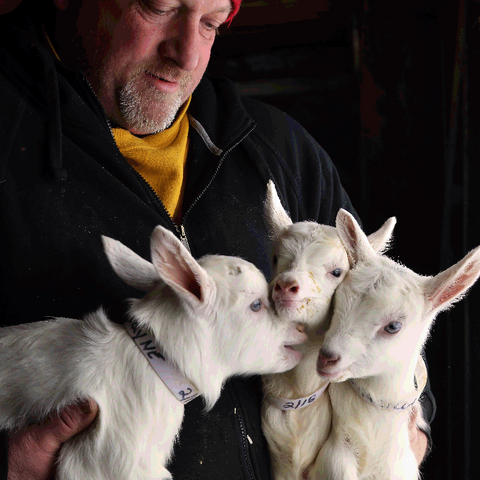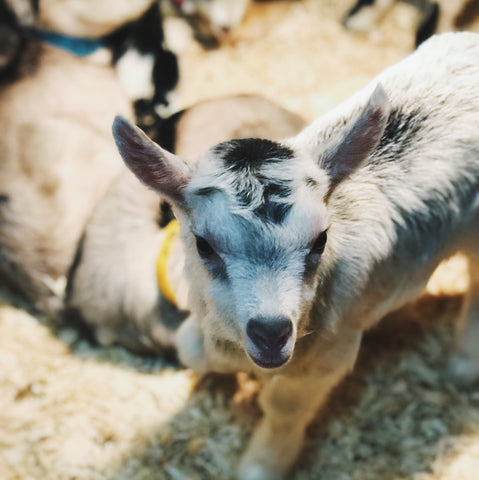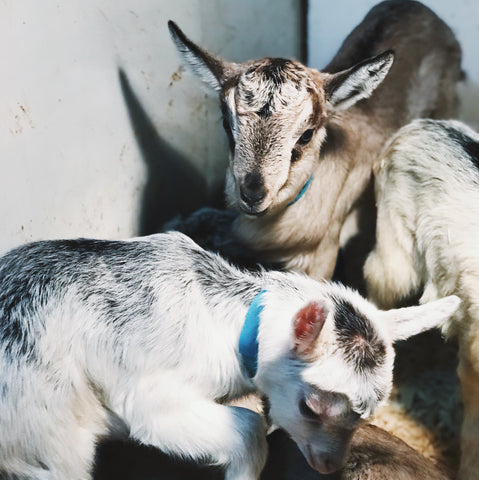
Whether they sproing around on four hooves or learn to walk upright on two feet, we can all agree that kids are a lot of work. Farmer John makes it look easy, but the TLC he gives his herd of goats is unmatched. Sometimes, love means going the extra mile, so at Beekman Farm, we choose to bottle feed our baby goats instead of letting the dams (mothers) feed their own kids. Sure, this requires a lot more work (round the clock baby goat bottle feedings, anyone?) but we believe bottle feeding is what’s best for the kids, the dams, and the health of Beekman farm. Why? Well, we’ve goat our reasons…
1. Caprine Arthritis Encephalitis
The health of our kids and dams is our first and foremost priority. Caprine Arthritis Encephalitis is a viral disease of goats that can often go undetected before it’s too late. CAE leads to arthritis, pneumonia, weight loss, and encephalitis (inflammation of the brain tissues.) CAE is passed on to the kids through the infected mother’s milk. While we’re proud to say our herd has tested CAE free for years, we continue to pasteurize the milk fed to the kids and bottle-raise each new herd every year.
2. Wean on Me
As if the arrival of dozens upon dozens of new baby goats under one barn roof isn’t stressful enough, fast forward to when it’s time to wean. Yikes. Weaning can be an incredibly stressful time for both mom and kid. But, by bottle feeding the kids from birth, Farmer John has all the control and can begin the weaning process when the time’s right by reducing the number of milk bottles fed to the kids. Sure, they might be hangry when they don’t get their bottle, but they’ll be far less confused and stressed because they’ll still be in the familiar company of the herd.

3. Stress Free Zone
Goats are instinctively skittish and wary of humans. Anyone who’s been around wild goats knows that it’s impossible to pet them. And since our goats eventually will be milked twice a day, it would be inhumane not to have them be comfortable around humans. Because Farmer John bottle feeds them from birth, our kids imprint on him and think of him as their caregiver. Thus when they’re fully grown, and ready to be milked, they actually look forward to the time they get to spend with Farmer John during milking time. Thanks for getting them used to the human race, Farmer John!
4. Udderly Smooth
Any mother who’s breastfed their child knows what havoc those little teeth and constant nibbles can wreak. It’s important for our dams to have healthy udders because healthy udders mean healthy milk. (Plus, the milking machine is just waaaaayyyy more comfortable than teeth.)

5. The Friendliest Kids
Many of you have toured the farm and witnessed first-hand the antics of our goats. Most of you have probably even gone away with goat nose prints on your cameras. Bottle-fed goats are more outgoing and less fearful because they’re used to seeking their needs from humans from day one. In fact, they kinda have us wrapped around their little fingers. (We mean hooves.)

6. Health is the Greatest Wealth
We started this list with our herd’s health, and we’ll end it with our herd’s health….because that really is our #1 priority. By bottle feeding, we’re able to keep a much closer eye on our kids during the crucial first few weeks of life, allowing us to monitor sickness, activity, mood, and other physical or behavioral concerns. Furthermore, not all dams produce enough milk to feed all their kids, which can sadly lead to starvation. In fact, some dames refuse to allow their kids to feed, for reasons no one fully understands. But by sharing the milk wealth across all the kids, no kid ever walks away hungry at Beekman 1802 Farm.